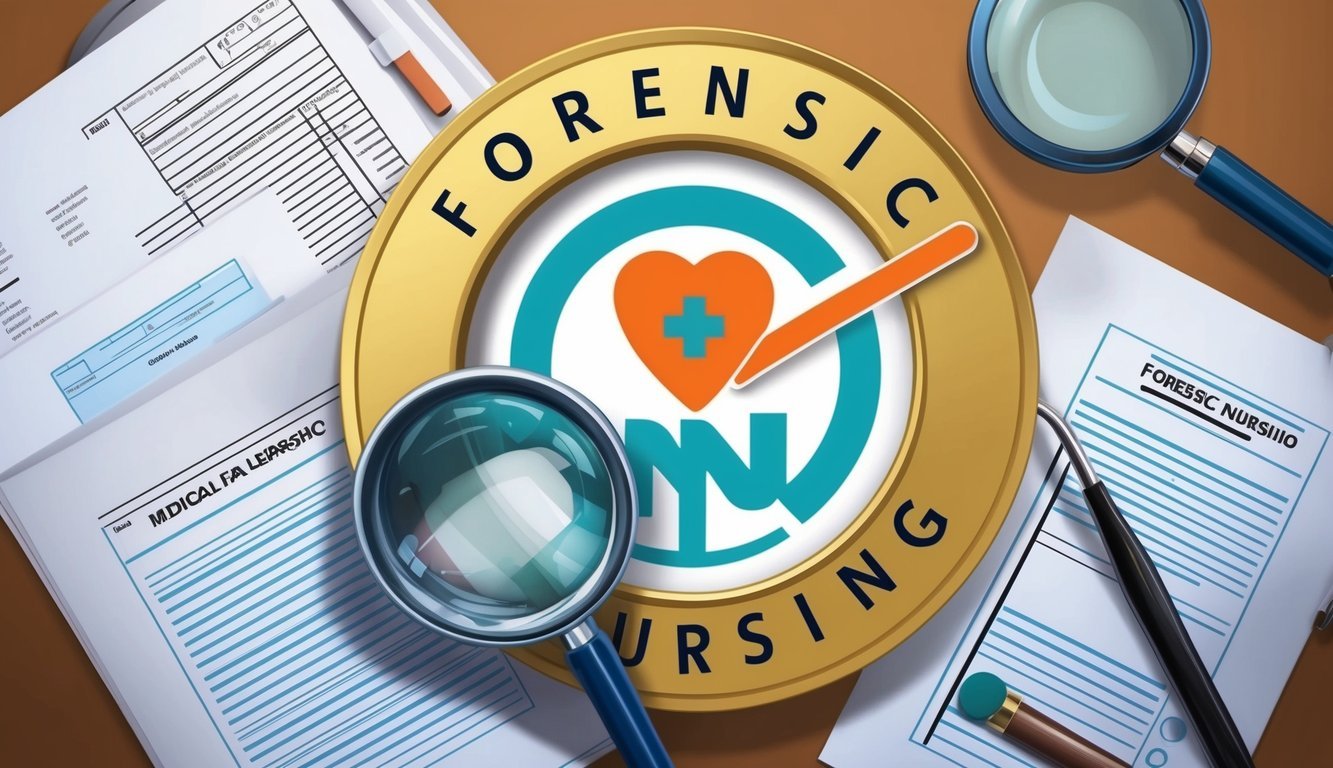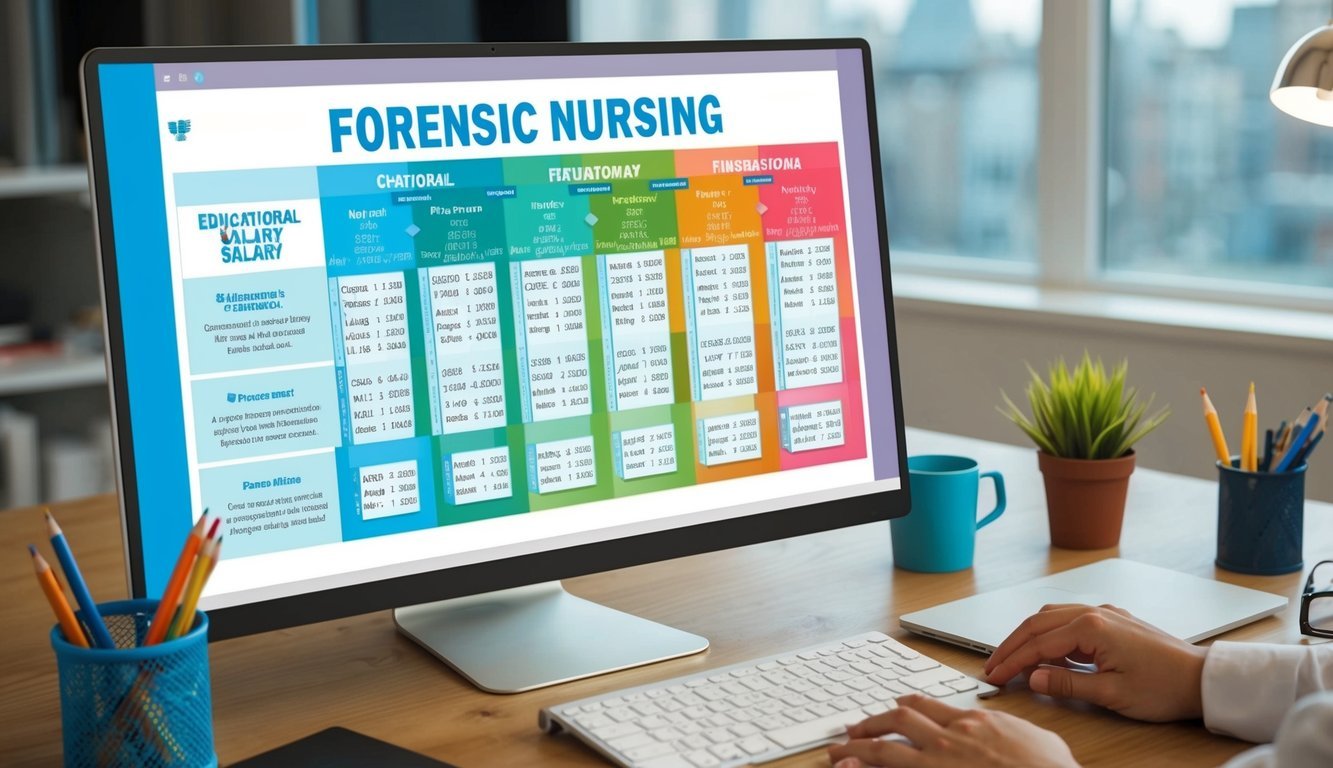Forensic nursing is a unique and vital field that bridges healthcare and the legal system.
If you’re considering a career in this area, understanding the potential earnings can help you make an informed decision. In 2024, a forensic nurse with a Master of Science in Nursing (MSN) degree earns an average salary of about $65,470 per year. This figure can vary widely based on experience, location, and the specific role you choose within the field.
As a forensic nurse, your work may involve caring for victims of crime, documenting evidence, and collaborating with law enforcement.
The demand for skilled professionals in this specialty is growing, making now a great time to enter the field.
With the right educational background and training, your opportunities for advancement and increased earning potential can be significant.
Choosing the right educational pathway is crucial for your career.
Many pursue an MSN in forensic nursing to enhance their skills and marketability.
With an advanced degree, you can take on leadership roles, earn higher salaries, and make a greater impact in both the healthcare and justice systems.
Key Takeaways
- Forensic nurses with an MSN earn approximately $65,470 annually.
- The demand for forensic nursing is increasing in both healthcare and law enforcement.
- Advanced education can lead to higher salaries and better job opportunities.
Overview of Forensic Nursing

Forensic nursing is a unique field combining healthcare and legal expertise.
You will learn about the roles and responsibilities of forensic nurses, how they connect with criminal law, and their significance in healthcare settings.
Roles and Responsibilities
Forensic nurses provide critical care in legal contexts.
They often work as Sexual Assault Nurse Examiners (SANEs), assisting patients who have experienced violence or assault.
Their responsibilities include:
- Collecting evidence: Gather and document evidence using established protocols.
- Providing medical care: Treat injuries while maintaining evidence integrity.
- Testifying in court: Offer expert testimony based on findings during examinations.
They must have strong communication skills and understanding of the legal system.
Your role will be vital in supporting victims and documenting cases for law enforcement.
Connection to Criminal Law
Forensic nurses play a key role in the legal system.
As specialists, you will be involved in documenting evidence that can impact criminal investigations and trials.
Understanding aspects of criminal law is essential.
You will work closely with law enforcement, attorneys, and detectives.
Your expertise helps ensure that evidence collected is admissible in court.
Forensic nurses also educate others about interpersonal violence and criminal behavior.
They help bridge gaps between healthcare and legal systems, improving outcomes for victims and contributing to justice.
Significance in Healthcare
The significance of forensic nursing in healthcare cannot be overstated.
By addressing both physical and emotional needs, you support patients in trauma care.
Forensic nurses provide holistic care that considers the psychological impact of violence.
Your role involves connecting patients to mental health resources, ensuring comprehensive support.
Moreover, you will contribute to forensic science by documenting and reporting findings accurately.
This data can aid in developing policies and improving healthcare protocols for victims.
Your work is imperative to enhancing both patient care and legal processes.
Educational Pathways

Pursuing a career in forensic nursing requires specific educational qualifications.
You will find that advanced degrees, like a Master’s in Forensic Nursing, and relevant certifications are crucial steps toward success in this field.
Advanced Degrees in Forensic Nursing
To become a forensic nurse, you typically need to earn an MSN in Forensic Nursing.
This graduate program focuses on integrating nursing practice with legal and ethical principles.
You will study subjects including:
- Forensic science
- Criminal justice
- Trauma nursing
Many programs also offer online or hybrid options, making it easier for you to balance work and study.
Completing an accredited program can enhance your job prospects, as employers often prefer candidates from recognized forensic nursing programs such as those offered by institutions like Nurse.org.
Additionally, some programs offer specializations that can tailor your skills to areas like sexual assault, domestic violence, or legal consultation.
Certification and Accreditation
After completing an MSN in Forensic Nursing, obtaining certification can set you apart.
The American Nurses Credentialing Center (ANCC) offers certification for forensic nurses, which demonstrates your expertise in the field.
To maintain your certification, you will need to meet specific continuing education requirements.
Make sure that your program is accredited.
Accreditation from organizations such as the Commission on Collegiate Nursing Education (CCNE) guarantees quality education.
This adds value to your degree and can open doors for better job opportunities.
Always check the accreditation status of any forensic nursing program before enrollment.
Career Outlook

The career outlook for forensic nursing is promising, with a growing job market and competitive salaries.
A combination of increasing demand for forensic nurses and a focus on specialized training makes this a viable career choice.
Job Market and High Demand
Forensic nursing is a specialty that blends healthcare and criminal justice.
As crime rates rise and public awareness of forensic science grows, the demand for skilled forensic nurses is also increasing.
Many hospitals, law enforcement agencies, and legal teams seek registered nurses with training in this area.
The need for forensic expertise in sexual assault cases and other trauma cases has driven this demand.
The Bureau of Labor Statistics projects a steady increase in employment for registered nurses, which includes those entering the forensic field.
Your career prospects improve as more healthcare facilities recognize the importance of forensic nursing.
Salary Expectations and Highest-Paying States
The salary for forensic nurses varies by location and experience level.
According to data, the average salary for a forensic nurse is around $65,466 annually, although this can change based on certifications and education.
Here’s a look at some of the highest-paying states for forensic nurses:
| State | Average Annual Salary |
|---|---|
| Massachusetts | $101,050 |
| Michigan | $78,260 |
| National Average | $65,466 |
Many forensic nurses in states like Massachusetts earn significantly more than the national average.
Your earning potential can increase as you gain more experience and explore advanced education options, like an MSN in Forensic Nursing.
For detailed salary data by state, visit NursingProcess.org.
Professional Development

Forensic nursing offers many opportunities for professional growth.
By focusing on continuous learning and establishing strong networks, you can enhance your skills and career prospects in this specialized field.
Continuous Learning and Skill Enhancement
Continuous education is vital in forensic nursing.
You should seek advanced training to stay updated with the latest techniques and practices.
Enrolling in a Master’s in Forensic Nursing (MSN) program can be a key step.
These programs often cover crucial subjects like pathophysiology, which is important for understanding patient care in forensic settings.
Additionally, pursuing certifications, like becoming a Sexual Assault Nurse Examiner (SANE), can elevate your qualifications and help you provide specialized care for victims.
Participating in workshops and online courses can also sharpen your skills in areas such as evidence collection and trauma-informed care.
Always look for opportunities to learn about new tools and technologies in forensic nursing.
Networking and Professional Associations
Networking is essential for your growth in forensic nursing.
Joining professional organizations can connect you with other nurses, investigators, and legal professionals.
Associations like the International Association of Forensic Nurses (IAFN) offer resources, forums, and events that can help you build relationships in your field.
Participating in conferences enables you to share experiences and gain insights from peers.
Engaging in local chapters can lead to mentorship opportunities, which can be critical in your career development.
Networking can also help you find job openings and collaborations in your area of interest.
Make use of platforms like LinkedIn to keep in touch with colleagues and stay aware of industry trends.
Frequently Asked Questions
When considering a career in MSN forensic nursing, several key aspects can influence your salary and job prospects.
Understanding these factors will help you make informed decisions about your career path.
What factors influence an MSN forensic nurse’s salary?
Several elements can impact the salary of an MSN forensic nurse.
These include education level, geographic location, the healthcare facility type, and specialization within forensic nursing.
What is the typical salary range for MSN forensic nurses in different states?
The salary for MSN forensic nurses varies by state.
For instance, nurses in states like California tend to earn higher salaries compared to those in states with a lower cost of living.
You can explore detailed state-by-state salary information here.
How does experience level affect the salary of an MSN forensic nurse?
Experience plays a significant role in salary levels.
Entry-level positions may start lower, but as you gain more experience, your pay can increase significantly.
Typically, experienced nurses earn higher salaries due to their developed skills and expertise.
What are the job prospects for MSN forensic nurses across the United States?
The demand for forensic nurses is growing as the need for specialized care increases.
Job prospects are generally favorable, especially in urban areas with high crime rates or in healthcare facilities that require forensic services.
How does obtaining an MSN in forensic nursing impact a nurse’s career trajectory and salary potential?
Obtaining an MSN in forensic nursing can open up advanced career opportunities and significantly enhance your earning potential.
Holding this degree may qualify you for leadership roles and specialized positions, which often come with higher salaries.
What are the potential career advancements for MSN forensic nurses?
An MSN in forensic nursing can lead to various advanced roles.
These include forensic nurse practitioner, clinical nurse specialist, or educator.
These positions often provide not only higher salaries but also more influence in the field of nursing.

